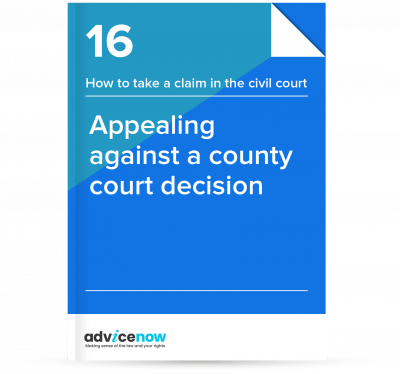Serve
To serve a legal document means to formally deliver it.
If you are the appellant, you should send a copy of your appellant’s notice and any supporting documents to the respondent, as soon as you can, and no later than seven days from the date you started (issued) your appeal. The respondent does not have to respond, unless you already have permission to appeal.
You then need to complete and send or take to the court a certificate of service as soon as possible confirming when and how you delivered the appeal.
Which court to send your appeal to
This depends on the level of judge who made the decision. A county court has two levels of judge - district judges and circuit judges. A circuit judge is more senior than a district judge. Generally, though not always, small claims and some fast track claims will be dealt with by a district judge or deputy district judge. Higher value and more complicated cases including some fast track claims will usually be dealt with by a circuit judge.
If your case was decided by a district judge, or deputy district judge, you need to appeal to the circuit judge.
If your case was decided by a circuit judge, you need to appeal to the High Court.
The judgment will say whether it was made by a circuit judge or district judge. (If you see the letters HHJ in front of the judge’s name, that means they were a circuit judge. If you see the letters DJ or DDJ it means they were a district judge or deputy district judge.)
You can find information to help you start your appeal in the right court.
Transcripts
You may need a transcript of the judgement you want to appeal. This depends on what type of claim you are appealing:
Small claims - you do not need to get a transcript of the judgment or provide one to the court or the respondent in a small claim appeal.
Fast track claims - the appellant must apply for an approved transcript of the judgment where it has been officially recorded as soon as possible or within seven days of sending the appellant's notice. You do not need a transcript of the whole hearing, just the judgment, unless you need a transcript of other parts of the recording because they are relevant to establishing the merits of your appeal
If the judgment was not recorded, then the appellant must get a copy of the written judgment. If that is not available either, then the appellant and respondent to the appeal must agree a note of the judgment and send it to the judge who decided the case for their approval.
For information about how to apply for a transcript, how much it costs and when you may be able to get a free transcript see https://www.gov.uk/apply-transcript-court-tribunal-hearing
Permission to appeal has been refused – what happens next?
If your paper application for permission to appeal has been considered and refused, you can ask the judge to reconsider at an oral hearing. This is provided the judge has not decided your claim cannot possibly succeed. You only have 7 days after receiving the refusal to apply for an oral hearing, and you also have to send a copy of your request to the respondent.
Permission has been given - what happens next?
The court will write to you (by sending you a notice) to tell you when your appeal will be heard, and what you need to do to prepare for the appeal hearing.


